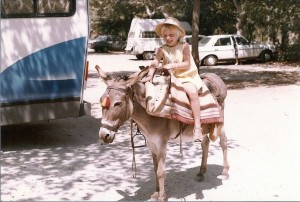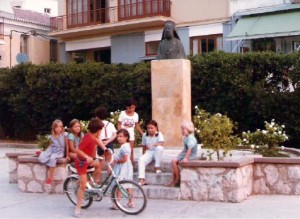(And the last of my reminiscence of living in Athens from 1983 to 1985)
This is the conversation I had many times, on my days off while we were in Athens, when we would be sightseeing here and there, or taking the city bus downtown to the Zappion Gardens, and encounter a friendly and overwhelmingly curious local citizen who spoke English:
“Ahhh, you are American!? How long are you visiting Greece?”
“Yes. I’m not visiting, I’m assigned here; I’m in the Air Force.”
“Ahh, then your husband is at the Elleniko base! You live in where? Glyphada? Sourmena?”
“Umm. I am in the Air Force, and I live in Ano Glyphada.”
“But your husband, he is in the Air Force, too?” (They usually got a little puzzled at this point.)
“He is no longer my husband, or in the Air Force.” I would say, and they would usually change the subject at that point and ask about what I liked best about Greece. All but the dear elderly gentleman with his grandson, feeding the ducks at the Zappion Garden duck pond, who exclaimed, “But, Kyria, you must marry again at once! Your little daughter needs brothers!”
Of all the places I lived or traveled in, Greeks got down to the most intensely personal stuff on shorter acquaintance than anyone, even small-town Southern Americans. I think it is because even the big city, most were just a short time removed from a village where everyone knew everything there was to know about everyone else, back to any number of generations. Home, with a capitol H was a whitewashed stone and tile-roofed little village out in the islands, or in the mountains, to which you went in the summer, for Easter and over long holiday weekends; one merely lived in the city.

He was a big, jolly Greek, with a last name which was the same as that of a Greek Jewish family, who (according to an article I read on one of the English language monthlies) had run a thriving business manufacturing silk in the 1920ies and 30ies, before being deported and murdered by the Nazis. I asked Jake once if there was a connection, and he told me they were cousins, but very distant, and then we talked of other things. He would send the office boy for some soft drinks and cookies whenever we stopped by so a visit to his shop had to be fairly leisurely. (He also had an adequate restroom on the premises).
Nearby, off Ermou St. was a large souvlaki place, where we first ate a Greek specialty; souvlaki with a side of fries done in olive oil, which gave them an odd but not disagreeable taste. Fries in olive oil were one of those things which were easier to like than retsina; that local harsh red wine with a flavor like the way turpentine smells. You could get pretty much the same effect by chugalugging red jug wine and then licking a pine tree. It was also the custom for wine to be served along with mineral water, which I speculated was a throwback to classical times. It was thought very decadent in the ancient world, to drink wine straight. Those huge, punch-bowl containers in the museums are called “krators” and used to mix the wine for consumption.
One day we stepped into one of the shops in the tourist part of the old town, which specialized in reproductions of ancient pottery. They had set up one of their artists at the front window, a young woman with a huge vessel on the workbench in front of her, painting thousands of tiny shield and spear-bearing stick figures, with a tiny brush dipped in black slip. I pointed out the gods and warriors on the main facet of the vessel, between the bands of stick figures above and below, and explained to my daughter how the pot would be glazed and fired in a kiln, and how they used to do this by piling wood all around the finished pots. On the shelves behind the artist were finished samples of the various sorts of pottery: the classic black on buff, the brightly colored Minoan things painted with flowers and fish… and a row of classical replica pornographic plates. My daughter remained fascinated by the stick figures, fortunately and never looked up at the shelves. I am not sure at all what I would have said if she had asked what those men and women were doing.

Goodbye to Greece, which had been our home for a while, and yes, we had been very happy there indeed.
I must have some Greek in me somewhere.
I still don’t know if we are going to make it in September but I do appreciate your reminiscences.